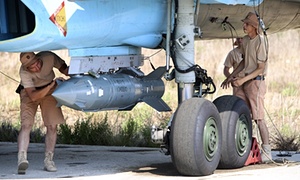(Introduction written by Nenada)
The Guardian has produced what is hopefully intended to be a satirical article, or else one of the most heinously bias and unfounded pieces of journalism to be found on their site. Even by their ever deteriorating standards. Basically, their story is this: the powerful alliance of suddenly unified and noble terrorists, or insurgents as they are now to be known, are vowing to fight against Russian forces in Syria. Actually, the Russian forces flying some of the most advanced fighter jets in the world are not Russian Airforce now but volunteers from Novorussia. And the air campaign is actually `Russian military aggression on Syria’ and `is considered a blatant occupation of the country.’ Whereas these terrorist groups are not occupying forces it seems. This is because: `Russia launched its air campaign on Wednesday and claims it is targeting the Islamic State group and al-Qaida’s Syrian affiliate, the Nusra Front. But many of the strikes appear to have hit western-backed rebel factions.’ The `proof’ for the last statement has repeatedly been discredited as Western propaganda and lies. But this is of course not part of the Guardian narrative. So here it is, an article which originally appeared in the The Guardian , written by Alec Luhn in Moscow, and some other `comedians’:
More than 40 Syrian insurgent groups have vowed to attack Russian forces in retaliation for Moscow’s air campaign, in a show of unity among the usually fragmented rebels against what they called the “occupiers” of Syria.
The 41 Syrian rebel groups, which included powerful factions such as Ahrar al-Sham, Islam Army and the Levant Front, said Russia had joined the war in Syria after president Bashar Assad’s forces were on the verge “of a crushing defeat”.
The insurgents’ warning came as the chairman of Russia’s parliamentary defense committee suggested that Russian “volunteer” units could join with forces fighting for Syria’s President Bashar al-Assad.
Vladimir Komoyedov, the former commander of the Black Sea fleet told the Interfax news agency that Russians who had previously fought alongside rebels in eastern Ukraine “can’t be stopped” from going to fight for the Assad regime.
“A unit of Russian volunteers, conflict veterans, will probably appear in the ranks of the Syrian army,” Komoyedov said. “What brings volunteers there besides the cause? Of course it’s probably money.”
Russia launched its air campaign on Wednesday and claims it is targeting the Islamic State group and al-Qaida’s Syrian affiliate, the Nusra Front. But many of the strikes appear to have hit western-backed rebel factions.
The Russian attacks have largely focused on the north-western and central provinces – the gateways to the heartland of Assad’s powerbase in the capital, Damascus, and on the Mediterranean coast.
On Monday Turkey said that its air force had intercepted a Russian fighter plane that had violated the country’s airspace while apparently flying a sortie over Syria – an incident that risked further inflaming tensions days after Russia’s military intervention began.
Turkey’s ministry of foreign affairs said it had summoned Russia’s ambassador after two F-16 fighter jets intercepted the Russian plane while it was flying south of Hatay, a province that borders Syria, on Saturday.
The Russian intervention has been widely criticised by Syrian opposition groups and activists, especially since Moscow once played the role of a mediator hosting rounds of talks between the Syrian government and its opponents.
“This new reality requires the region’s countries and the allies in specific to hasten in forming a regional alliance to face the Russian-Iranian alliance that occupies Syria,” the 41 factions said in a statement released by Ahrar al-Sham. It was apparently referring to backers of the opposition such as Turkey and Saudi Arabia.
A Syrian military official was quoted by state media as saying that Russian airstrikes on Monday hit in the central province of Homs and Idlib in the north-west.
The Britain-based Syrian Observatory for Human rights said warplanes believed to be Russian have targeted the northern town of Al-Bab that is a stronghold of the Islamic State group. It said the airstrike left “a large number” of casualties.
A Facebook page used by Isis posted photos of wounded people being treated in a clinic and another of what appeared to be a burned body being pulled out of a charred car. The Facebook page said dozens of people were killed or wounded in the airstrikes.
The Syrian militant and rebel factions, including the US-backed Division 101 and Tajammu Alezza, said “the Russian military aggression on Syria is considered a blatant occupation of the country even if some claim it was done with the official request of the Assad regime. Those who lost legitimacy can’t offer it.”
“All Syrian armed revolutionary factions must realise we are in a war to push an aggressor, a war that makes unifying ranks and word a duty on all brothers,” the factions said in the two-page statement posted online. “Any occupation force to our beloved country is a legitimate target.”
Earlier in the day militant websites report that Syria’s Muslim Brotherhood declared that jihad against the “sheer Russian occupation of Syria” is a legitimate duty for everyone capable of carrying weapons.
The Kremlin has admitted military specialists are in Syria to train local troops how to use Russian weapons, and a Russian battalion is believed to be there to protect the airbase in Latakia. But President Vladimir Putin has said he will not deploy ground troops to Syria.
However, reports have alleged that Russians who had previously fought in eastern Ukraine have been spotted among Syrian government forces.
Fighting as a mercenary is illegal under Russian law, but Komoyedov’s statement to Interfax has prompted speculation that the Kremlin could encourage irregular forces to fight in Syria, much as it reportedly did in eastern Ukraine.
“The Russian regime has carefully avoided the issue [of its use of mercenaries], because it has never has talked about the money received by those fighting in eastern Ukraine,” said defence analyst Alexander Golts.
“If the head of the parliament’s defence committee talks about money from the start of the Syria conflict, that means that one of leading faces of the regime is endorsing the use of mercenaries. I want to believe in adequacy of the Russian leadership. Any attempt to start a ground operation in Syria won’t lead to victory, as the past five to 10 years has showed. It will lead to catastrophe.”
The reported scale of the Russian mercenary presence in Syria is small. A fighter who took part in the eastern Ukraine conflict told newspaper Kommersant at the end of September that he was helping send Russians to fight against the Islamic State in Syria for money. He said 12 of his charges were already in Iraq and another 20 or so were preparing to travel to the Middle East in October.
Ramzan Kadyrov, the head of Russia’s Chechnya republic, said last week he was ready to send his soldiers to Syria. Many Chechen fighters took part in the eastern Ukraine conflict, but Kadyrov said recently all Chechens there would be withdrawn from the country.
Ruslan Leviyev, a citizen journalist who has published investigations of Russian soldiers and equipment in eastern Ukraine and more recently in Syria, on Monday posted on Facebook a summons he had received to the prosecutor general’s office for questioning.
His reports on the deployment of Russian soldiers to Syria, a taboo topic until the Kremlin recently began admitting it had military advisers there, have been sensitive. One woman reportedly wrote to him that prosecutors had opened a case against her soldier husband after Leviyev’s investigation traced his deployment to Syria.







